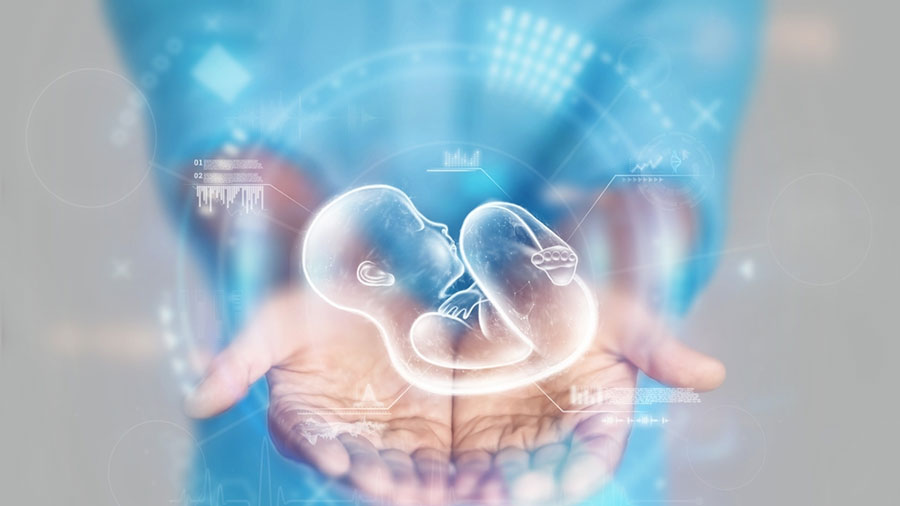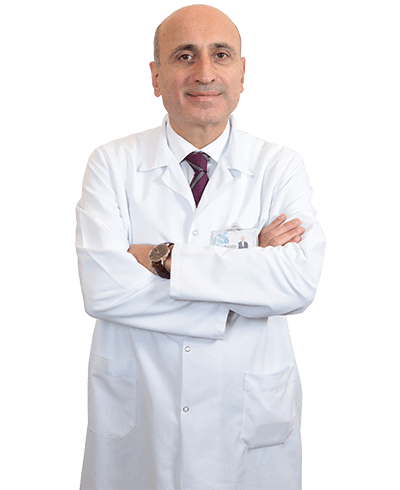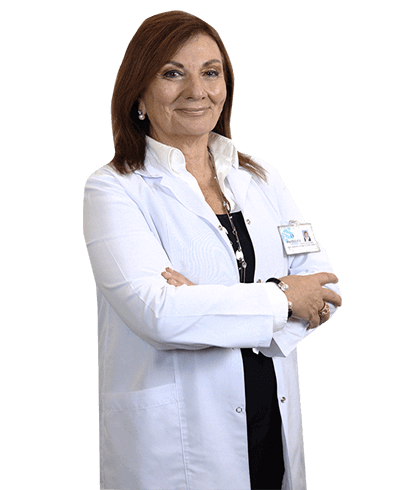
In Vitro Fertilization (IVF) Treatment in Gynecology and Reproductive Health unit at Medistate Kavacık Hospital
Experience the Journey to Motherhood with IVF
Welcome to the IVF Unit at Medistate Kavacık Hospital, where we share your journey towards motherhood with excitement and dedication. Our comprehensive IVF treatment offers unwavering support and guidance throughout every step. Our team is committed to keeping you informed and answering all your queries, ensuring your path to parenthood is well-guided and stress-free. To provide you with a clearer picture of what lies ahead, we’ve prepared this informative brochure. We encourage you to read it thoroughly.
The procedure of the in vitro fertilization consists of three stages:
- Ovarian stimulation
- Egg retrieval and fertilization
- Embryo transfer
Stage One: Ovarian Stimulation
Ovarian Stimulation: The IVF process begins with stimulating the development of eggs within your ovaries. This involves the secretion of the estradiol hormone as your follicles grow. Monitoring these follicles’ growth and number is achieved through vaginal ultrasounds (USG). This combined with estrogen hormone (E2) levels and ultrasound scans helps evaluate egg quality and maturity. Your personalized treatment plan, medication type, and dosage are determined based on your clinical and laboratory results. Throughout this stage, you will be called in for ultrasound and hormone checks at specific intervals (usually 3-4 times during treatment).
The doctor will provide updates on serum E2 levels and medication dosages. Note that the quantity of eggs may differ from the count of follicles observed in ultrasounds. Mature eggs often stem from follicles exceeding 14mm in diameter. Ultrasound evaluations also consider the endometrium’s composition and thickness—the womb’s innermost layer. This layer significantly influences embryo development and the conception process.
The follicular growth phase averages around 9-10 days, though its duration can vary. Once follicles reach a specific size threshold, the final injection (HCG), often referred to as the egg maturation trigger, is administered to ensure eggs reach full maturity. The goal is to retrieve eggs at an optimal maturity level without premature release. On average, eggs are collected approximately 26 hours after this injection. This procedure is conducted under anesthesia, ensuring a painless experience for the patient.
Stage Two: Egg Retrieval and Fertilization
Egg retrieval: As the egg retrieval procedure is carried out under anesthesia, it is necessary to avoid eating and drinking liquids for at least 6 hours before the procedure. The procedure takes an average of 5-15 minutes. During this procedure, the follicles containing the eggs are suctioned by inserting a thin needle into the ovaries under the control of a vaginal ultrasound. The patient may leave the hospital 2 hours after the procedure is completed. Before discharge, our nurses will inform patient about instructions and medications to be taken.
Sperm Retrieval: Partner’s sperm will be collected at the same time as the egg retrieval procedure. If the man is found to have azoospermia (a condition in which there are no sperm in the semen), the semen is of poor quality or it is not possible to take any sample, semen will be taken from the testicles surgically on or before the day of the egg retrieval. If surgically removed, the surgically removed testicular tissue will be frozen and thawed on the day of the microinjection. Not all eggs may be available for the microinjection procedure. On the following day, our embryologists will inform patient of the number of fertilized eggs. Depending on the number of fertilized eggs and the quality of the embryos, the day of transfer will be determined.
As part of the egg retrieval process, your partner will provide a semen sample. Our embryologists will provide detailed guidance on necessary steps and considerations. To facilitate this process, we have a dedicated room designed specifically for semen sample collection. Patients encountering any challenges with this aspect are encouraged to communicate their concerns with our medical team prior to the procedure.
Fertilization: Conventional In Vitro Fertilization Approach: The original technique in IVF, this method involves encircling each egg with 50,000 – 100,000 sperm, anticipating the fertilization of eggs by one sperm. To achieve success, a satisfactory quantity and quality of sperm are vital.
Microinjection Technique: A widely adopted method, particularly valuable for male-related factors. It stands as the primary option in such cases. Under microscopic precision, a singular sperm is delicately injected into every mature egg using specialized pipettes. Notably, this method is renowned for yielding heightened fertilization rates.
The Fertilization Process: Around 16-18 hours later (approximately a day following microinjection), an evaluation determines if fertilization between sperm and egg occurred. Barring exceptions, embryo transfer does not occur on the same day. Fertilized eggs are carefully returned to the culture medium, where they advance through subsequent developmental stages.
Stage Three: Embryo Transfer
Embryo Transfer Process: The timing of embryo transfer is meticulously determined, factoring in variables like the number of fertilized eggs, developing embryo quality, and any pertinent details from the patient’s medical history. Gently, the progressing embryos are introduced into the patient’s uterus via a catheter. This straightforward procedure doesn’t require anesthesia. To ensure a clear view for the embryo placement on the ultrasound, your bladder needs to be comfortably distended. Scientifically, a mere 2-hour rest after transfer at the hospital supports successful pregnancy prospects.
Strategic Embryo Number and Freezing: Guided by age and prior attempts, the decision regarding the count of embryos to transfer is made. When suitable in both quantity and quality, surplus embryos post-transfer can be frozen, with family consent. This dual advantage arises: If conception doesn’t occur, subsequent embryo transfers are more cost-effective, eliminating the need for further egg retrieval surgeries and costly needles. Additionally, these preserved embryos offer the chance for expanding the family, even after achieving the first child’s birth.
Confirming Pregnancy: Pregnancy Test
Around 12 days subsequent to the embryo transfer, a blood test (Beta-hCG) unveils your pregnancy status. Should the outcome be affirmative, a follow-up test is conducted two days later. This interval generally witnesses a twofold rise in the initial value. It’s crucial to note that menstrual cycles not aligning with pregnancy shouldn’t be considered a failure. Around three weeks post-transfer, an ultrasound can reveal the gestational sac, offering further insight into your journey.
Treatment Outcome: Measuring Success
It’s essential to understand that IVF treatment doesn’t guarantee universal success. The age of the woman stands out as a pivotal influence on the treatment’s effectiveness. Consequently, prompt initiation of treatment post-decision is imperative. Both women and men are advised to avoid smoking, a factor significantly linked to diminished success rates. Occupational exposure to chemicals or toxins, as well as working in environments with elevated temperatures (like factories or bakeries), may adversely affect sperm quality and quantity.
Conversely, certain factors can limit egg availability. A family history of early menopause, personal history involving Hashimoto’s thyroiditis, prior ovarian surgery, or endometriosis may reduce the count of eggs compared to one’s age group. It’s essential to maintain optimism even in the face of negative treatment outcomes. The presence of viable eggs in women and functional sperm in men signifies an ongoing chance for pregnancy.
Services available in the Gynecology and Reproductive Health Unit at Medistate International Hospital
Female Assessment: A thorough evaluation of the woman’s reproductive health forms the foundation of our services.
Male Assessment: Similar attention is dedicated to assessing the man’s reproductive health, ensuring holistic care.
Reproductive Health Check-up: We provide a specialized program aimed at optimizing reproductive health through comprehensive check-ups.
Sperm Analysis with Sperm Chip: Our advanced sperm analysis utilizing the Sperm Chip offers valuable insights for informed decision-making.
Intrauterine Insemination (IUI): A method involving carefully orchestrated sperm placement within the uterus to enhance chances of conception.
Assisted Hatching: We offer Assisted Hatching to aid embryos in breaking out of their outer shells, facilitating implantation.
In Vitro Maturation (IVM): The innovative IVM technique is available, tailored to specific cases.
Pre-implantation Genetic Screening/Diagnosis (PGS/PGD): For precision, we provide PGS/PGD to assess embryo genetic health before implantation.
Cryopreservation Services: Preservation options include freezing procedures, empowering choices for future family planning.
Surgical Sperm Retrieval: For complex cases, we offer surgical sperm retrieval methods like TESE, TESA, PESA, and MESA. At Medistate International Hospital, we take pride in our diverse array of services, all designed to cater to your unique needs and aspirations
M.D. Kenan Sofuoğlu
Gynecology and Obstetrics, Gynecology and Reproductive Health / IVFEducation Work Experience / Post-Specialization Training Medical Interests
DetailsProf. Oya Gökmen
Gynecology and Obstetrics, Gynecology and Reproductive Health / IVFEducation Work Experience / Post-Specialization Training Medical Interests
Details



